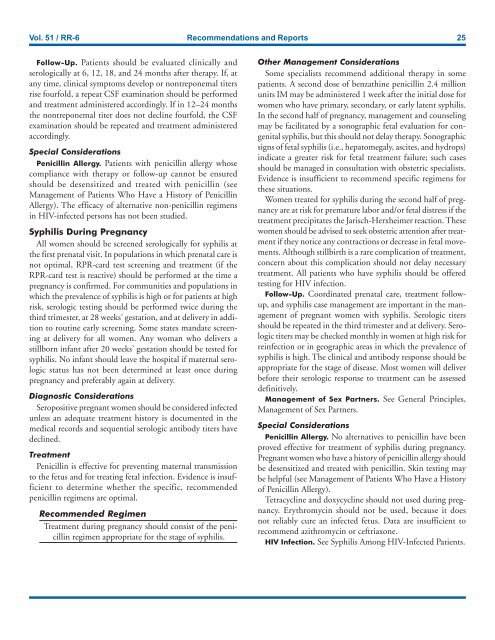You also want an ePaper? Increase the reach of your titles
YUMPU automatically turns print PDFs into web optimized ePapers that Google loves.
Vol. 51 / RR-6 Recommendations and Reports 25<br />
Follow-Up. Patients should be evaluated clinically and<br />
serologically at 6, 12, 18, and 24 months after therapy. If, at<br />
any time, clinical symptoms develop or nontreponemal titers<br />
rise fourfold, a repeat CSF examination should be performed<br />
and treatment administered accordingly. If in 12–24 months<br />
the nontreponemal titer does not decline fourfold, the CSF<br />
examination should be repeated and treatment administered<br />
accordingly.<br />
Special Considerations<br />
Penicillin Allergy. Patients with penicillin allergy whose<br />
compliance with therapy or follow-up cannot be ensured<br />
should be desensitized and treated with penicillin (see<br />
Management of Patients Who Have a History of Penicillin<br />
Allergy). The efficacy of alternative non-penicillin regimens<br />
in HIV-infected persons has not been studied.<br />
Syphilis During Pregnancy<br />
All women should be screened serologically for syphilis at<br />
the first prenatal visit. In populations in which prenatal care is<br />
not optimal, RPR-card test screening and treatment (if the<br />
RPR-card test is reactive) should be performed at the time a<br />
pregnancy is confirmed. For communities and populations in<br />
which the prevalence of syphilis is high or for patients at high<br />
risk, serologic testing should be performed twice during the<br />
third trimester, at 28 weeks’ gestation, and at delivery in addition<br />
to routine early screening. Some states mandate screening<br />
at delivery for all women. Any woman who delivers a<br />
stillborn infant after 20 weeks’ gestation should be tested for<br />
syphilis. No infant should leave the hospital if maternal serologic<br />
status has not been determined at least once during<br />
pregnancy and preferably again at delivery.<br />
Diagnostic Considerations<br />
Seropositive pregnant women should be considered infected<br />
u<strong>nl</strong>ess an adequate treatment history is documented in the<br />
medical records and sequential serologic antibody titers have<br />
declined.<br />
Treatment<br />
Penicillin is effective for preventing maternal transmission<br />
to the fetus and for treating fetal infection. Evidence is insufficient<br />
to determine whether the specific, recommended<br />
penicillin regimens are optimal.<br />
Recommended Regimen<br />
Treatment during pregnancy should consist of the penicillin<br />
regimen appropriate for the stage of syphilis.<br />
Other Management Considerations<br />
Some specialists recommend additional therapy in some<br />
patients. A second dose of benzathine penicillin 2.4 million<br />
units IM may be administered 1 week after the initial dose for<br />
women who have primary, secondary, or early latent syphilis.<br />
In the second half of pregnancy, management and counseling<br />
may be facilitated by a sonographic fetal evaluation for congenital<br />
syphilis, but this should not delay therapy. Sonographic<br />
signs of fetal syphilis (i.e., hepatomegaly, ascites, and hydrops)<br />
indicate a greater risk for fetal treatment failure; such cases<br />
should be managed in consultation with obstetric specialists.<br />
Evidence is insufficient to recommend specific regimens for<br />
these situations.<br />
Women treated for syphilis during the second half of pregnancy<br />
are at risk for premature labor and/or fetal distress if the<br />
treatment precipitates the Jarisch-Herxheimer reaction. These<br />
women should be advised to seek obstetric attention after treatment<br />
if they notice any contractions or decrease in fetal movements.<br />
Although stillbirth is a rare complication of treatment,<br />
concern about this complication should not delay necessary<br />
treatment. All patients who have syphilis should be offered<br />
testing for HIV infection.<br />
Follow-Up. Coordinated prenatal care, treatment followup,<br />
and syphilis case management are important in the management<br />
of pregnant women with syphilis. Serologic titers<br />
should be repeated in the third trimester and at delivery. Serologic<br />
titers may be checked monthly in women at high risk for<br />
reinfection or in geographic areas in which the prevalence of<br />
syphilis is high. The clinical and antibody response should be<br />
appropriate for the stage of disease. Most women will deliver<br />
before their serologic response to treatment can be assessed<br />
definitively.<br />
Management of Sex Partners. See General Principles,<br />
Management of Sex Partners.<br />
Special Considerations<br />
Penicillin Allergy. No alternatives to penicillin have been<br />
proved effective for treatment of syphilis during pregnancy.<br />
Pregnant women who have a history of penicillin allergy should<br />
be desensitized and treated with penicillin. Skin testing may<br />
be helpful (see Management of Patients Who Have a History<br />
of Penicillin Allergy).<br />
Tetracycline and doxycycline should not used during pregnancy.<br />
Erythromycin should not be used, because it does<br />
not reliably cure an infected fetus. Data are insufficient to<br />
recommend azithromycin or ceftriaxone.<br />
HIV Infection. See Syphilis Among HIV-Infected Patients.


